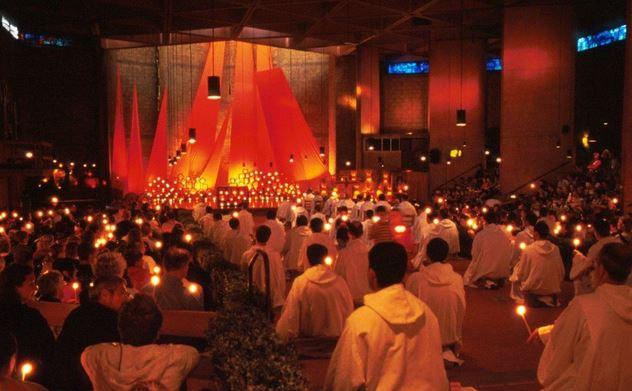Taizé

Taizé is an ecumenical Christian community and a spiritual movement founded in 1940 in the village of Taizé, France, by Brother Roger Schütz. It is known for its focus on simplicity, reconciliation, and unity among Christians from various denominations. The Taizé community has become a significant center of Christian pilgrimage and prayer, attracting thousands of young people from around the world every year.
Key Aspects of Taizé:
-
Ecumenical Spirit:
-
One of the central principles of Taizé is its ecumenical nature, meaning it is open to Christians from all denominations, including Roman Catholics, Orthodox Christians, and Protestant groups. The community's emphasis on Christian unity aims to transcend theological differences and promote mutual understanding and cooperation among different branches of Christianity.
-
The community's ecumenical focus is grounded in the belief that the world’s divisions should be overcome in the pursuit of a shared Christian faith, and this is reflected in the diversity of visitors and participants in Taizé gatherings.
-
-
The Founding of Taizé:
-
Brother Roger Schütz, a Swiss Protestant, founded the Taizé community during the Second World War. He felt a calling to create a space where Christians could come together, share in fellowship, and seek peace amidst the turmoil of war.
-
The community began with a small group of young people and grew over time, especially after the war, as it became a place of refuge and spiritual renewal for those seeking peace and reconciliation.
-
-
Spiritual Practices:
-
Prayer and Worship: At the heart of the Taizé community is a daily rhythm of prayer, which includes chants, scripture readings, and silent meditation. The prayer services are simple, contemplative, and repetitive, allowing participants to focus on God’s presence and deepen their connection to the divine.
-
Taizé prayer is characterized by the use of repetitive chants, which are sung in various languages and can be understood as a form of meditative prayer that helps participants enter a space of silence and reflection. These chants often emphasize themes of peace, unity, and trust in God.
-
-
Taizé Music:
-
The Taizé chants are some of the most recognizable elements of the Taizé community's worship. These chants are simple, repetitive, and easy to sing, often consisting of a few short phrases repeated many times. They are designed to help participants enter into prayer and meditation more easily.
-
The music is deliberately simple, and the repetitive nature of the chants helps create an atmosphere of calm and reflection. Many of the chants are sung in multiple languages, which reflects the ecumenical and international spirit of the Taizé community.
-
The melodies are typically soft and meditative, and the chant lyrics often center on themes like peace, hope, and faith.
-
-
Pilgrimages and Youth Meetings:
-
The Taizé community hosts pilgrimages of trust and youth meetings throughout the year, which attract tens of thousands of young people from across the globe. These events provide an opportunity for young people to gather, pray, reflect, and engage in dialogue with people of different cultures and Christian traditions.
-
The main site in Taizé hosts thousands of pilgrims, especially during summer months, where individuals and groups participate in daily prayer, work, and study. Visitors often stay for a few days or weeks, participating in the life of the community and experiencing the spirit of unity and peace that characterizes the Taizé movement.
-
Annual international meetings are held in various cities around the world, where Taizé’s ecumenical spirit of reconciliation is shared with people from different Christian backgrounds. These meetings often involve prayer, dialogue, and joint service projects.
-
-
Community Life:
-
The Taizé community is monastic in structure, with brothers (or members) committing to a life of prayer, simplicity, and service. The brothers live in community, follow a vow of poverty, and dedicate themselves to spiritual life and hospitality.
-
The brothers of Taizé live a simple lifestyle, focusing on prayer, manual work, and service to others. The community also emphasizes an openness to those outside of its immediate circle, welcoming visitors from all over the world.
-
-
Commitment to Reconciliation:
-
Reconciliation is a core value of the Taizé community. Brother Roger Schütz founded Taizé during a period of great division and conflict in Europe, and reconciliation has remained a central goal of the community. Taizé's commitment to peace is reflected in the ways it engages with communities in conflict zones, offering a space for dialogue and understanding.
-
The community continues to support reconciliation efforts in various areas, including promoting peace between Christians and Muslims, fostering dialogue between different Christian denominations, and engaging in interfaith dialogue.
-
-
The Impact of Taizé:
-
Taizé has had a profound influence on contemporary Christian spirituality, particularly among young people. Its simple, accessible approach to worship, prayer, and community life has resonated with individuals seeking a more contemplative and inclusive experience of faith.
-
The Taizé community’s focus on simplicity, peace, and ecumenism has inspired many individuals and Christian organizations to prioritize unity and collaboration across denominations and cultural boundaries.
-
The community’s legacy continues to grow, with Taizé-inspired worship services and prayer groups found in many Christian communities worldwide.
-
Brother Roger’s Legacy:
-
Brother Roger Schütz, the founder of Taizé, passed away in 2005, but his legacy continues to inspire people of all ages and backgrounds. His vision of creating a space where people could come together in prayer and reflect on God’s love and peace remains central to the Taizé movement. Today, the Taizé community is led by brothers who carry on his work, maintaining the vision of a Christian community dedicated to peace, reconciliation, and unity.
Conclusion:
Taizé is much more than just a place; it is a movement that focuses on prayer, simplicity, and Christian unity. The community’s commitment to ecumenism, its emphasis on peace, and its deeply reflective worship style through Taizé chants have made it an influential force in modern Christian spirituality. Through its pilgrimages, youth gatherings, and simple monastic life, Taizé continues to draw people from all over the world to experience a shared vision of peace, unity, and reconciliation.

